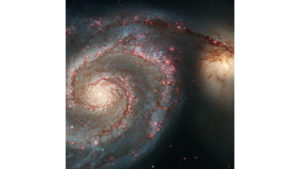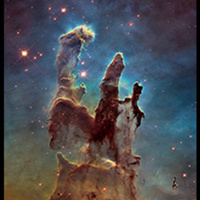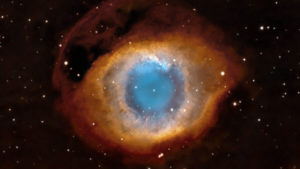
“The heavens declare the glory of God, and the sky above proclaims his handiwork. Day to day pours out speech, and night to night reveals knowledge” (Psalm 19:1-2). It is inconceivable to me how anyone can stand outside gazing into the night sky on a clear night, away from the lights of our villages, towns, and cities, and think, “What an accident!” The wonders that are visible to our naked eye take away one’s breath; then, when we see pictures taken by instruments such as the Hubble space telescope, our sense of awe only deepens. Standing in the middle of the countryside and beholding the wonder of both firmament and space, one cannot help but to feel incredibly insignificant, but when we remember that everything we see was created in order that humans could have a place to live and flourish in God’s grace, we are humbled even further.

Not everyone comes to that same conclusion, however. Consider the words of the early 20th century historian Carl Becker: “What is man that the electron should be mindful of him! Man is but a foundling in the cosmos, abandoned by the forces that created him. Unparented, unassisted and undirected by omniscient or benevolent authority, he must fend for himself, and with the aid of his own limited intelligence find his way about in an indifferent universe.” Here is a man who has looked into the same night sky as you and me, yet Becker came to a very different conclusion. He saw in the universe nothing except indifference and chance…certainly no loving, merciful, personal God.

This week marked the passing of one of the greatest minds of science who ever lived, Stephen Hawking. The famed physicist was known for his work with relativity and black holes, uniting relativity and quantum mechanics into a theory of cosmology. He was equally known for his physical disability, caused by a rare motor neuron disease (ALS, or Lou Gehrig’s Disease) that confined him to a wheelchair and left him only able to speak through a voice synthesizer. Both his brilliance and his disability contributed to him being equally recognizable in the academic and pop culture worlds. His book, A Brief History of Time, has consistently been on the bestseller list, although Hawking jokingly observed that it was the “most popular book never read” (I might suggest another title for that dubious honor…).

Despite his undeniable brilliance, Hawking looked into the same night sky as you and me and came to the same conclusion as Becker. As he grew older (itself an outpouring of God’s common grace, as he had been told at his diagnosis in 1964 that he only had a couple of years to live), his heart grew harder toward the things of God. Early on, some of his comments seemed to indicate that he held to a private faith (examples: “The [physical] laws may have been created by God, but God does not intervene to break the laws” and, in reference to a grand unifying theory, “It would be the ultimate triumph of human reason – for then we should know the mind of God”). In 2014, though, he made his clearest statement on the matter: “What I meant by ‘we would know the mind of God’ is, we would know everything that God would know, if there were a God. Which there isn’t. I’m an atheist.” Based on his own words, Hawking sadly stepped into eternity apart from Christ. He now knows the error of his thinking, but it is now too late for him. There are people in each of our lives who are just like Hawking – not necessarily brilliant scientists, but lost and standing on the precipice of Hell. Whenever we hear news like this, our hearts should be burdened even more for those who need to hear about the wonderful, matchless grace of Jesus. If you don’t tell them, who will? Just something to think about…

0 Comments